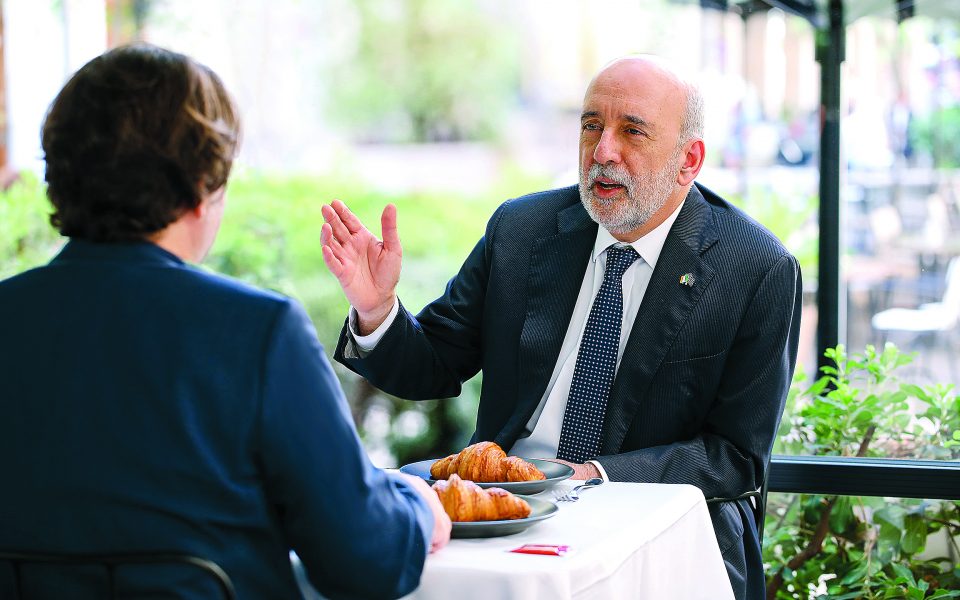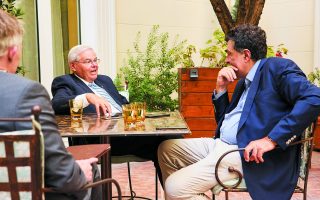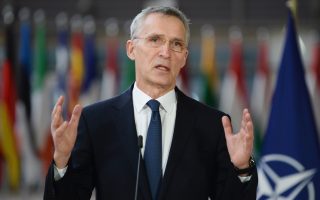‘You are chock-full of talented individuals’
Gabriel Makhlouf, the cosmopolitan governor of the Central Bank of Ireland, talks to Kathimerini about the country he loves to return to

Gabriel Makhlouf has had an unusual personal journey, while his family history reflects that of the Southeastern Mediterranean over the last 100 years. As an economist he became the private secretary to Britain’s then Chancellor of the Exchequer Gordon Brown, part of the Blair administration, in 1997. For some time now he has lived in Nea Smyrni, Athens, where he owns a house and supports Panionios, the local football team.
Makhlouf, a friend of Bank of Greece Governor Yannis Stournaras, speaks fluent Greek, and since 2019 has been the governor of the Central Bank of Ireland. He arrives at our rendezvous at one of Athenee’s outdoor tables on the pedestrian-only Voukourestiou Street, on a Friday morning.
He smiles and orders a frappe, only for the waitress to respond that they do not serve frappe at Athenee. The central banker settles for a Greek coffee and begins by telling me a little about his family’s history. “My great-grandfather on my father’s side left Lebanon and moved to Cyprus, where they acquired British citizenship. Decades later his grandson, my father, moved to Egypt to work at the British Embassy. My other grandfather, on my mother’s side, was Armenian. At the beginning of the 20th century, he lived in Istanbul, while the rest of his family lived in Asia Minor. In 1915 they were all killed. The Turks sent my grandfather to Smyrna, where he met my grandmother, who was Greek. They married in 1920, and moved to Athens in 1922, following the Smyrna Catastrophe.”
“My mother was born here in Athens. In 1933 they built the house in Nea Smyrni which we still live in. In 1939 my grandfather found a job in Egypt. That same summer my grandmother and mother went to meet him in Cairo. But as the war began, they couldn’t return and ended up staying in Egypt for 20 years. My mother found a job at the British Embassy, where she eventually met my father. After my grandfather’s passing, my grandmother returned to Greece, living until the age of 105. Shortly after my birth in 1960, my father began working for the United Nations and we moved to a different country almost every year. I have a younger brother who was born in the Congo. When I was 11 we lived in the island country of Samoa in the Pacific Ocean. It was during that time period that my parents decided it was best for me to settle down and have a steadier attendance at one school, without changing incessantly. And so they sent me to a boarding school in Bath, England, and later to the University of Exeter to study economics.”
Makhlouf worked in the English civil service – including senior positions in the tax service – for 20 years. In 1997, for one year, he became the private secretary to Chancellor of the Exchequer Gordon Brown. He paid frequent visits to his mother in Athens for years, sometimes as short as just a weekend. Unfortunately, she passed away four months ago at the age of 97.
When the first lockdown was imposed, shutting down most of Europe, Makhlouf came to Athens for several months to be close to his mother. By using modern technology, he could simultaneously live in Athens and work at his office in Dublin. He took over as governor of the Central Bank of Ireland in September 2019, after almost nine years working as secretary of the New Zealand Treasury. “After nine years my wife wanted to return to Europe, so we returned,” he says. They have a son who lives and works in London.
“Great things”
Makhlouf observed the Greek government-debt crisis from New Zealand. Was he ever concerned that Greece may find itself ousted from the eurozone? “I was watching everything unravel from Wellington. I was never concerned with the possibility of a Grexit, but I was worried about many of the developments I saw and anxious as to how the crisis would be handled.” Today, he believes all that is in the past. “Greece has great potential –t needs to straighten out its priorities and continue to push ahead with reforms. This requires strong dedication to its goals and unwavering political leadership. Regardless, the fact remains that the country is chock-full of talented individuals. You can achieve a lot.”
Greece remained in the eurozone, but in a dramatic twist, the United Kingdom left the European Union entirely. Makhlouf believes that all of Europe would be better off if the UK was not only a member of the EU but also the eurozone. However, he also acknowledges the difficulty of abandoning the pound. Regarding Brexit, he responds thoughtfully by reflecting on the continent’s history and explaining that the institution of the European Union can be interpreted as a successful “peace mission” which has allowed one of the longest periods of peace in European history. It is precisely for this reason that any weakening of the EU cannot be described as positive in the long run.
ECB’s Greek speakers
“There are now three central bankers –nd members of the Governing Council of the European Central Bank –ho speak Greek,” says Makhlouf, meaning Yannis Stournaras, governor of the Bank of Greece, Constantinos Herodotou, governor of the Central Bank of Cyprus, and himself. “The day before yesterday we were in Frankfurt, Italy’s central banker [Ignazio Visco] heard us speaking in Greek and approached to say that he had also learnt Ancient Greek at school.” In 2019 the British press described Makhlouf as the only Briton who participates on the Governing Council of the ECB. How does he feel about the fact that he embodies such diverse attributes and perspectives? “For me this is something altogether normal,” is his response. It is certainly normal for him to understand arguments and mitigate differences between people from different monolingual or ethnic backgrounds.
Makhlouf has stood out due to his unique economic philosophy, which stresses the importance of patience in achieving long-term goals. “The mission of a ministry of finance is to improve its citizens’ quality of life,” he says, while also explaining that all decisions must be planned and taken within an intergenerational framework that accounts for climate change and shifting demographics. He also believes that narratives move the world, and cites Nobel Prize-winning economist Robert Shiller’s 2019 book “Narrative Economics.”
“Shiller argues that powerful narratives can have an economic impact. The challenge I want to tackle is the creation of narratives that inspire patience when implementing long-term policies.” Makhlouf’s narrative is that debt sustainability depends on creating an economy with sustainable productivity. Considering the impacts of climate change, sustainable productivity can only be achieved if current borrowing is directed toward green investments to create a carbon neutral economy. Such a model, paired with the dizzyingly fast digitization we are seeing, can contribute to a far more dynamic economy which can handle public debt, ensure financial and price stability, and, most importantly, improve living standards.
This is the narrative that New Zealand has been able to follow since Jacinda Ardern’s election in 2019 and her introduction of the first “Well-Being Budget.” According to Makhlouf, the key to prosperity is to make today’s decisions while looking 30 years into the future.
Santorini, Ithaca and Isthmia
We’ve said a lot. He believes that cryptocurrencies are the best way to lose money. He is not particularly worried about the coronavirus, having been vaccinated and wearing a mask wherever he goes. He sees the European economy recovering, despite the pandemic being far from over. He’s traveled everywhere in Greece, but singles out Santorini as his most frequented location (“except in August”). He loves Ithaca. “When I was a 20-year-old I would go to Ithaca every summer.” Besides those locations, his “base” is a summerhouse in Isthmia, from where he and his wife head out on excursions all over the Peloponnese.
His life & career to date
1960
Born in Cairo to a Cypriot-British father and a Greek-Armenian mother.
1971
Goes to boarding school in Bath.
1978
Begins studying economics at the University of Exeter. Continues with a master’s degree at the University of Bath.
1997
Private secretary of Gordon Brown, Britain’s chancellor of the Exchequer.
2011
Becomes secretary of the Treasury and senior economic adviser to the New Zealand government.
2011-19
Develops the foundational principals behind New Zealand’s “Well-Being Budget.”
September 2019
Becomes governor of the Central Bank of Ireland.
2020-21
Spends several months of the lockdown at his home in Nea Smyrni, Athens.





